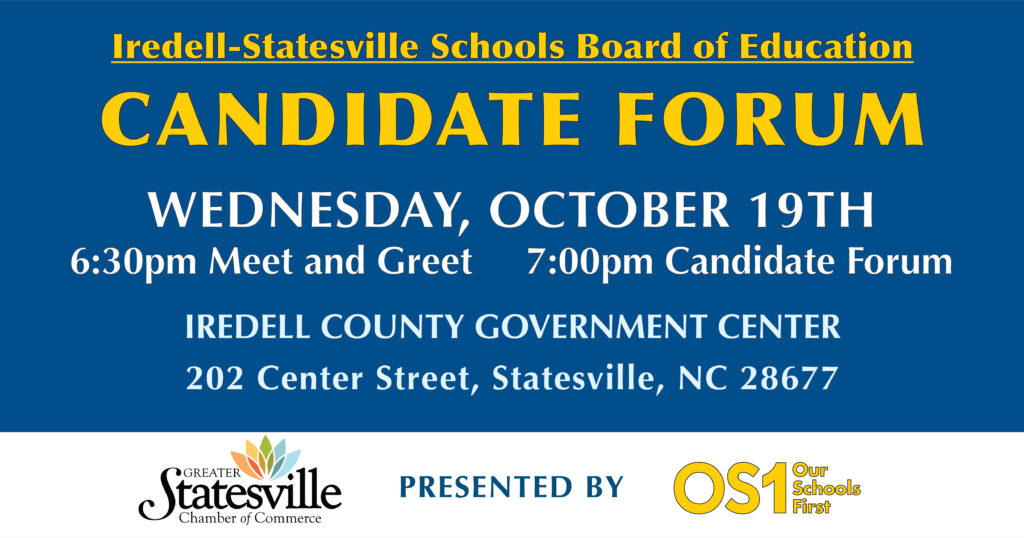
Join candidates for Iredell-Statesville Schools Board of Education at a Candidate Forum, sponsored by Our Schools First and the Greater Statesville Chamber of Commerce!
The forum is scheduled for Wednesday, October 19th at the Iredell County Government Center. You are invited to meet and greet candidates beginning at 6:30 p.m. Candidates will then be invited to share information about their campaign for the board beginning at 7:00 p.m.
Why do Board of Education elections matter? Read this excerpt from Public Schools First NC:
No elections get closer to our children’s schools than the local public school board elections.
In N.C., all traditional public school board members are elected and must reside within the community served by the school district. Ideally, having community members serve on the school board helps to keep members invested in the health of the public schools since schools have such a large influence on the overall health of a community. Note that charter school boards are NOT elected by the public and they are only required to have 50% of their appointed members reside in N.C. Private schools have no state residency requirement at all and oversight is viable and rarely public.
According to N.C. General Statutes, local school boards have broad authority to determine policies regarding how schools are run as long as they focus on the education of students:
“It shall be the duty of local boards of education to provide students with the opportunity to receive a sound basic education and to make all policy decisions with that objective in mind, including employment decisions, budget development, and other administrative actions, within their respective local school administrative units, as directed by law.”§ 115C-47 (4)
The primary responsibilities of the boards of education as they endeavor to ensure a high-quality education for every student while meeting the requirements of state law are to:
- Provide leadership and direction by developing goals and objectives to meet stated established standards for student success
- Create policies that guide the operations, standards, accountability, and evaluations of the school districts
- Employ the superintendent and make decisions about the superintendent’s personnel recommendations
- Determine operating and capital budgets, present the budget to county commissioners and advocate for appropriate funding
- Oversee the management of the school district’s major systems including budget and finance, curriculum and instruction, personnel, and other services
- Approve student assignment boundaries
Equally important, school board members set the tone for community engagement on educational issues. Do the members respect educators and treat them as professionals? Do they respect parents and community members and welcome their feedback? Do they engage in civil discussions with each other and move toward solving problems collaboratively? Do they always keep the health and education of all students as their primary goal?
A detailed description of the powers and duties of the local boards of education is included in state statute. It’s a very long list highlighting the extent to which school board members influence all aspects of school district functioning. To adequately fulfill these duties and to be strong advocates, school board members work to understand what’s happening on a daily basis in schools throughout the district.
Local school boards also engage parents and communities in developing successful programs. Guidelines are explicitly stated in the statute. For example, “Local boards of education are encouraged to adopt policies to promote and support parental involvement in student learning and achievement at school and at home and to encourage successful progress toward graduation.”
By law, school boards must hold monthly meetings that are open to the public and provide opportunities for public comment. The transparency and openness of public schools and school boards are unique among educational offerings in North Carolina. Neither charter schools nor private schools have the same requirements for parental and community involvement or public engagement in board meetings.
In North Carolina, school boards do not have taxing authority; county commissioners have the final say in how much of the school district’s budget request will be funded each year. Approximately 23% of a district’s budget comes from local funds, so a good working relationship between the county commissioners and school board members is important.
According to N.C. General Statues, local school boards were originally designed to be elected on a non-partisan basis. However, state lawmakers have the authority to change this and over the years many school board elections have been changed to partisan races. In 2015 only 16 of the 115 districts in N.C. held partisan school board elections. This year, there are 43. If your district holds partisan elections (Iredell-Statesville School’s board is partisan), the party affiliation of all candidates will appear on the ballot.
The need for strong public school systems that help develop successful individuals, healthy communities and strong economies is obvious to people across the political spectrum.
Make sure to research your local school board members to understand whether they will be true advocates for children and promote healthy, fully-funded public schools that respect educators and treat them as the professionals they are.
